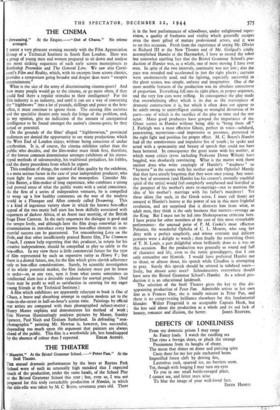THE CINEMA
Dreaming." At the Empire.--" Out of Chaos." No release arranged.
I SPENT a very pleasant evening recently with the Film Appreciation Group of a Technical Institute in South East London. Here was a group of young men and women prepared to sit down and analyse the most striking sequences of such early screen masterpieces as Battleship Potemkin and The General Line. We saw also Caval- canti's Film and Reality, which, with its excerpts from screen classics, provides a symposium going broader and deeper than mere " escapist entertainment."
What is the size of the army of discriminating cinema-goers? And how many people would go to the cinema, or go more often, if they could find there a regular stimulus to their intelligence? For the film industry is an industry, and until it can see a way of converting the " highbrows " into a lot of pounds, shillings and pence at the box- office, it must continue to ignore them. The existing film societies and the specialist theatre only touch the fringe of the problem, and, in my opinion, give no indication of the amount of unorganised intelligence to be found amongst the nation's cinema-goers, be they actual or potential.
On the grounds of the films' alleged " highbrowism," provincial audiences are denied the opportunity to see many productions which the West End of London enjoys. without being conscious of undue cerebration. It is, of course, the cinema exhibitor rather than the public who decides, and the film-maker must think first, therefore, of the lowest common denominator amongst exhibitors of his stereo- typed methods of salesmanship, his traditional prejudices, his foibles, and the dusty precedents from which he argues.
This condition of things, the control of film quality by the exhibitor, is a most serious factor in the case of your independent producer, who must fight for screen time against the monopolies. Consider Mr. John Baxter, a film-maker of long experience, who combines a strong and proved sense of what the public wants with a social conscience. As the first of a series of independent ventures, he is compelled to wrap up a few healthy comments on the way of the modern world in a Flanagan and Allen comedy called Dreaming. This is a kind of ingenious variety show in which the known box-office appeal of the two music hall stars has been skilfully associated with sequences of darkest Africa, of an Ascot race meeting, of the British Stage Door Canteen. In the early sequences the dialogue is good and the tempo lively, and although-later the film drags somewhat in its determination to introduce every known box-office element its com- mercial success can be guaranteed. Yet remembering Love on the Dole, and that other insufficiently praised Baxter film, The Common Touch, I cannot help regretting that this producer, in return for his creative independence, should be compelled to play so safely to the box-office. In my view there is little commercial future for the type of film represented by such an expensive rarity as Henry V ; but there is a dismal future, too, for the film which gives slavish adherence only to box-office considerations. Surely, by scientific investigation of its whole potential market, the film industry must put its house in order—or, at any rate, turn it from what seems sometimes an intellectual slum into a desirable residence for normal people. (And there may be profit as well as satisfaction in catering for my eager young friends at the Technical Institute.) A film which exhibitors are apparently reluctant to book is Out of Chaos, a brave and absorbing attempt to explain modern art to the man-in-the-street in half-an-hour's screen time. Paintings by official war artists are compared with their photographed subject-matter ; Henry Moore explains and demonstrates his method of Work ; Eric Newton illuminatingly analyses pictures by Moore, Stanley Spencer, Paul Nash and Graham Sutherland. In defending " non- photographic " painting Mr. Newton is, however, less successful, depending too much upon the argument that painters are always ahead of the public. This film is a worthwhile job, less handicapped by the absence of colour than I expected. EDGAR ANsrEY.


























 Previous page
Previous page